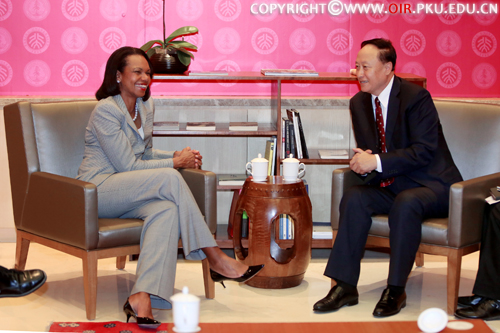In the afternoon of September 22, 2015, Ms. Condoleezza Rice, Former Secretary of State of the United States and current professor of political science at Stanford University, met with Zhu Shanlu, the Chair of Peking University Council, and gave a speech about Urbanization and Technology at the inaugural session of the Lee Shau Kee World Leaders Forum at the Stanford Center at Peking University (SCPKU).

Ms. Rice and Mr. Zhu on Cooperation
During the meeting between Ms. Rice and Mr. Zhu, Mr. Zhu expressed his appreciation for Ms. Rice and Stanford University for their support and friendship. He also explained the unique and important roles that universities play in international relations and the development of societies.
Ms. Rice then said that she has fond memories of her time at PKU the last time she visited 10 years ago. She also explained that the SCPKU serves as a strong base for achieving shared goals.
Ms. Rice on Urbanization and Technology
According to Ms. Rice, one of the most pertinent issues in the modern era is how to govern. Difficulty in governing people in ways that are acceptable to them and gives them results. People are expecting more and from their government, because what happens in the village doesn’t stay in the village, and that means people know what happens in other places all around the world.

Rice: Can we govern better if we utilize technology?
“Technology is not good or bad in of itself”, Ms. Rice explained, “It’s not helpful or harmful. Technology, in itself, is neutral.” Technology can make some problems better and can make some problems worse. Innovation needs to be understood in terms of application by humans, “Technology doesn’t change history”, Ms. Rice said, “people use it to change history.”
“Technology is the application of knowledge to problems.”
“Technology is the application of knowledge to problems” Ms, Rice expalined. With technology comes efficiency of economic growth—doing more with less. With technology there are new ways to do just about everything. Technology is changing the very nature of the economy. As with all changes, Ms. Rice continued to expound, there is good and bad: The Good, more efficiency; the bad, less people can participate in the economy.

Urbanization
Ms. Rice explains that urbanization is something that we have taken as a given for the past 100 years. Urbanization drove better lives; many people left farms for the cities. African Americans left the south and went to the cities to better their lives. China has also urbanized, and many people have gone to the cities. China wants to urbanize even more. However, Ms. Rice believes that these large cities are straining under a growing population and increasingly detrimental environmental situation, in addition to these difficulties, there is the problem of providing jobs to all the people in the city. Ms. Rice believe technology can be used to allow smaller cities to have some of the luxuries of larger cities, and by people choosing to live in smaller cities, governance stays closer to the people and less strain on the governance apparatus.
Technology and Education
Ms. Rice explained that innovation is the key to development, and that technology can be used to enhance education and to solve some modern problems. This is especially true for the poorest of the world and for disenfranchised women and girls. By using technology to expand upon education, to use technology to ensure that everyone has access to education, some modern issues like a booming population and issues and political disenfranchisement issues can be mitigated or even solved. The logic, Ms. Rice explains, is that educated women and girls will not have children an early age, and they will demand political rights equal to men.

Equal Opportunity is the Key
Ms. Rice finished her speech with an emphasis on opportunities. If everyone feels they have a fair chance, an equal chance in life, they will be more likely to be satisfied, and she continued to explain that education is a crucial part of giving people an equal chance.
Background Information:
The Lee Shau Kee World Leaders Forum has the mission of raising public understanding of the complex issues China and other countries face in the course of development; to foster engagement among government, academic, private sector, and civil society leaders; and to increase support of the United States and Asia-Pacific cooperation.



